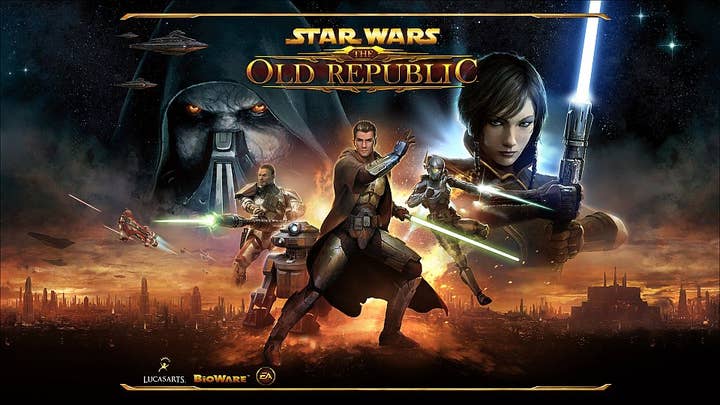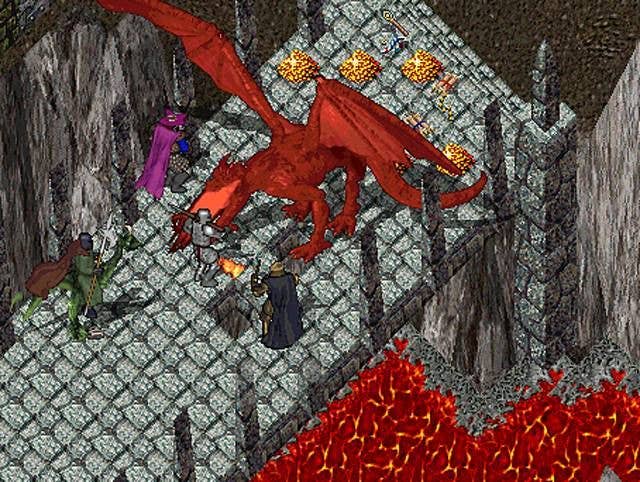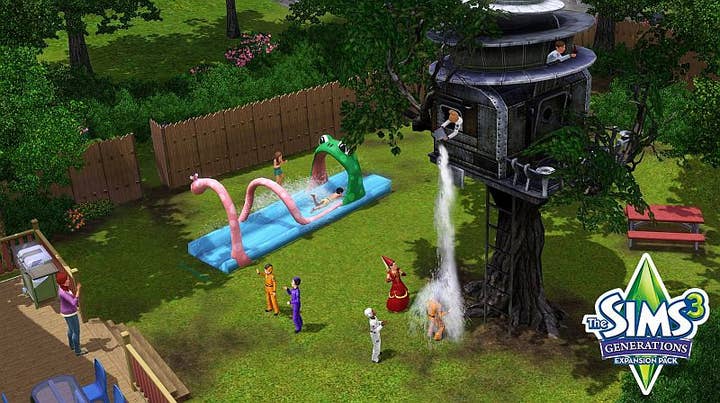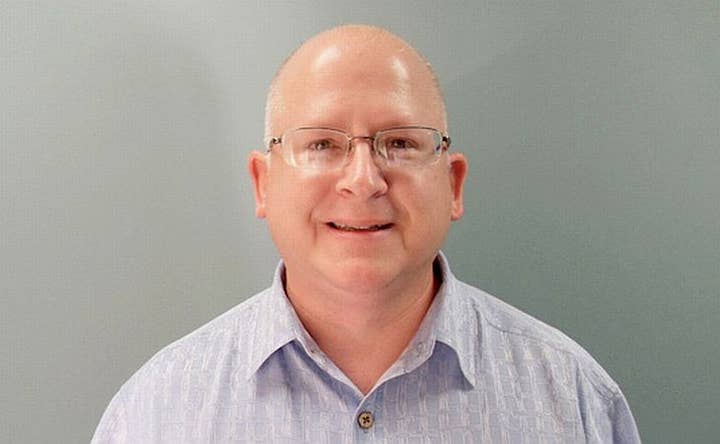Gordon Walton: Publishers see devs as "replaceable meat puppets"
Veteran exec laments the treatment of dev teams, talks about Riccitiello's struggle, and predicts Activision's business ending in "catastrophe"
Gordon Walton has been building computer games for over 35 years, and recently was laid off as VP and executive producer of Playdom's Austin studio as Disney shut down that operation. Prior to his time at Playdom, Walton was VP and co-studio general manager for BioWare Austin, and before that held a similar role for Sony Online Entertainment, Maxis (managing The Sims Online), Origin Systems and numerous other game companies. Walton has been responsible for managing game projects such as Star Wars: The Old Republic, Ultima Online, and The Sims Online.
Walton's vast experience in the game business gives him an interesting perspective to view the massive wave of change sweeping over the game industry. GamesIndustry International sat down with Walton at GDC to talk about the changes he's seen and what's coming up next.
Walton spent many years building games to put in boxes for retail stores, and over time began concentrating on online games, which demands a relationship between the company and individual gamers. That's a difficult transition for publishers used to the old way of doing business. "Most of the big companies I work for think about the consumers like a faceless mass, and not about people," Walton said. "People are the ones using our stuff. Even in the mid '80s, when I was doing games then, I always went to alpha as quickly as I could. I was on the online services and I would recruit people who were interested in the topic and I would have forty or fifty people playing my early game and giving me feedback, because you can't see the forest for the trees when you're making the game. Just because you made it for yourself, and your team, and they all think it's cool, doesn't mean a damn thing if customers don't think it's cool."
"Just because you made it for yourself, and your team, and they all think it's cool, doesn't mean a damn thing if customers don't think it's cool"
Walton believes that customer feedback is integral to making better games. "It's not just any customer feedback, it's the customers that you're actually going to target with the game," Walton noted. "Particularly the early adopters who are going to be your mavens for everyone else. If I can please the most demanding consumers, I can probably please a lot more."
Walton sees the greater community involvement with game development as a good thing, but he cautions that the feedback you receive has to be analyzed carefully. "I think the challenge with Kickstarter, as with any online community, is realizing the vast majority of people look but don't talk," Walton explained. "You can over-react to the vocal minority, but what you can get from the vocal minority is the big ideas, the big trends. What really engages the passion? Typically it's not 'If you give me a button right here that makes it easier for me to do this, that's going to engage my passion' that's not what they're talking about. They're talking about the core experience that really engages their imagination."

The increasing quality of graphics has not been an unalloyed benefit to games. "If you think about the games we made a long time ago, the games were more imagination and less exposition. We've come to a place where it's more exposition and less imagination," Walton said. "It's challenging, because people are just not as engaged if their imaginations aren't engaged."
Walton agreed with the comment that Jordan Weissman made when he said he wants to use the Infinite Resolution Rendering Engine inside people's heads. "Will [Wright] says similar things. It's about building the mental models that the player's going to engage in, that lets them have ownership. Both of them are right about that," Walton said. "You can see it proven out when you look at Sims 1. Sims 1 was bigger than Sims 2 and bigger than Sims 3, and it was the least high-res. It gave you iconic stuff instead of expository stuff. And you were listening to that simulation, making up what it meant in your head. You were looking at their tiny little animations and you were putting the emotion in there."
"The business that we've had is not so much coming to an end as it's transitioning pretty radically"
"I worked there, and we had research around this. One of the biggest fears in doing Sims 2 was when you make it more expressive, you're going to lose a lot of the player connection where they're making up what it means. Ten players might think it means three different things or more, and it was all OK. But if you actually see the character make an expression, then you go 'Oh, that's not what I was expecting' and there's more disconnect at some level. I think the numbers prove that out; even though all the products were successful nothing was a s big as Sims 1 because you could put more of you in it rather than it putting it on you."
This is part of what Minecraft has going for it, according to Walton. "It's so iconic that you're filling in more of the blank areas," he noted. "You have to engage your imagination to make that blocky guy look like what he really is. When you look at some of the early phone games you're back to a more iconic thing and just raw fun, rather than it has to be perfect animation and perfect exposition of the character."
The PS4 announcement had a lot of people talking about the innovation it will bring, but it really wasn't clear how this new hardware or other new consoles will drive innovation. "That's not unusual when a new hardware platform comes out," Walton said. "I think more of the innovation now is coming in business models and distribution models than it is going to be in super-duper hardware. The real key in game design is still interaction, and does that interaction set up the flow, which creates the endorphins and that sense of mastery that makes you feel like you're winning."

Walton's experience leads him to think big companies will continue to struggle in addressing the variety of business models and platforms and customer relationships. "I think it's very difficult for the big companies to change their DNA on the fly," Walton said. "If we were just getting better graphics, we'd be fine. When the fundamental underlying business model, when the fundamental margin structure and the way that you actually reach customers changes, I think it's very difficult for companies to say 'Oh, we're going to be an expert at putting boxes in stores, we're going to be an expert at doing online stores, we're going to be an expert at partnering with other people and ecosystems to make it happen.' A lot of their DNA conspires against being all those things."
"The business that we've had is not so much coming to an end as it's transitioning pretty radically. Because of that we've seen THQ go out of business, we've seen other businesses struggling, we see other businesses appear not to struggle - but it may be the innovator's dilemma, where they're right at that peak couple of years where they're going to look like they're God and then all of a sudden the bottom falls out from underneath them."
Looking at specific large companies and their recent performances, Walton had some incisive comments. "I give JR [John Riccitiello] a lot of credit for trying to change EA," Walton said. "He really worked hard at it. I think it's hard to change the DNA of a company, and that's the real struggle there. The struggle is not the leader saying 'We need to go into online.' The struggle is how the entire company structure works, how all the reward cycles within the company, how all the people in the company in positions of power grew up and what their muscle memory is. Their muscle memory is completely contrary to to many of the things that are going on now, and it's really hard to change."
"One day [Activision will] be the big fish at the bottom of the pond, and there'll be almost no food left and no water, and it's going to be hard to breathe. That's how that ends; it ends in catastrophe"
Gordon Walton
Conversely, Activision has not made the sweeping changes that EA has, and has performed well in the last few years. But that's not necessarily a great indicator of future performance. "Here's the Activision situation from my point of view," Walton explained. "Because they didn't spend energy trying to change, what they've done is gotten sharper and sharper at the things that they do really well. So they're looking like the cock of the walk. They look awesome because they haven't tried stuff that's failed, other than the normal trying new franchises and they're used to those kind of failures. They've haven't said we're going to fundamentally change our company, so they're going to be that last guy standing in the console world. One day they'll be the big fish at the bottom of the pond, and there'll be almost no food left and no water, and it's going to be hard to breathe. That's how that ends; it ends in catastrophe."
Walton continued, "From my ten thousand foot view, it always has amazed me that these companies don't have the discipline to spin off real independent business units that can actually make autonomous decisions. They always want to make them part of their core culture, and the core culture is antithetical to new business models. The culture is part of the problem if you want to do something different. What they always want is the business to conform to them, not to conform the business to what the context is. This is an old human story."
"Like when EA.com got created, the first time JR was at EA, this was the real problem. They tried to do EA.com inside of EA, and I had a conversation with JR in the formation meetings. 'We need to get this out of the building, it needs to be in its own building somewhere else, because the culture of EA is not gonna work with this whole online thing.' It was hard to explain, obviously. It was always 'oh, we can save money by sticking it in Redwood Shores.' 'Ask all the divisions to send us the people they don't want to staff it, so you don't have to lay 'em off.'"
"They had a particular set of objectives, and it was hard to hit 'em without doing some crazy stuff, and they didn't hit 'em. I think JR learned a lot from that experience when he came back the second time. I was much more happy with him the second time than I was the first. The first, it was 'Oh my God, we're steaming toward the iceberg and it's gonna hit us.' The second time he was trying to do the right thing. I think he underestimated just how entrenched that culture was, and how hard it was for him as a leader to get people to move in the direction he wanted without being probably being even more vicious than even he's capable of being."
Walton is philosophic about the overall game industry. "Change is going to continue to happen at an accelerating rate. That's the only truism of my entire adult career. You're either going to be surfing the wave or it's going to crash down on top of you."
"Nobody has all the answers, and we're discovering the answers. We're trying to make them up as we go along, so there's opportunity"
The current environment is one Walton finds invigorating. "I remember making three games in a year, and now that's possible again. It's a really exciting time to be in the business," Walton said. "I got that invigoration when I got involved in online back in '95, because at that point I'd already been in the business for 18 years. I knew how to make games, but making online games there were new rules, and we didn't know what they were. With these new mediums, it's the same thing. Nobody has all the answers, and we're discovering the answers. We're trying to make them up as we go along, so there's opportunity."
Walton feels there may be bigger changes ahead. "The thing that's most exciting to me is there are opportunities for complete disruptive innovation," he noted. "If you can think far enough outside the box, you might be able to come up with something that might turn the whole thing on its head again. The one thing we can reasonably predict is that we don't know what's going to happen in three years."
The big struggle of the early days of gaming was to find a way to reach a mass market, and Walton is pleased we've finally done that. "We won. Gaming has won," Walton proclaimed. "If you have access to an electronic device, more than likely you game; 80 to 90 percent of the people who have access to any computing device game. There's no battle there; it's just which gaming are they going to do."

The victory is not without its drawbacks, though. "We were so excited when the core gaming business went from being a hobby into a mainstream, semi-mass-market hobby," Walton recalled. "You could reach what we were calling mass markets; selling ten million games was a mass market. What it was was a very robust premium hobby business. For people who grew up on that, a lot of them are distressed by the fact that gaming has been completely democratized and exists on this giant palette of different devices."
"This giant ecosystem of diversity is in my mind fabulous," Walton said. "But if you were the major leagues, which is kind of the way the AAA guys think of themselves, all of a sudden the little leagues and the home teams and the company teams were all more important than the AAA teams, you would probably feel disenfranchised. It's very threatening; any time you get to the top of a plateau you want to rest, you don't want to say there's a whole 'nother mountain to climb."
It's not just daunting for publishers - it's tough on developers too. "For the individual developer, it's about achieving mastery and then realizing, 'Oh crap, I have to completely reinvent myself,'" Walton said. "While this experience I have is valuable, it doesn't make me a master at it. I have to go through and crawl from a beginner back up to a master, and it's not overnight. It's not one year. It's not like someone is coming to get you; the world is changing, that's all."
"If there was a Making Game Companies For Dummies book, that should be the core of it - how important coherent teams are"
What's next for Walton, now that Disney has released him into the wild? "I'll certainly try to do something interesting," Walton said. "The metagame that I play, since I'm a manager, is how to make people better at this business when they leave me than when I got 'em. Two, what can I do that can actually change the fundamentals of the business? How can I help move the business forward? I've done almost everything I always wanted to do and more; now I have to think up bigger challenges."
Does Walton aspire to be the new CEO of EA? "No thank you," he said quickly. "I had that thought once when I first worked for EA. I thought, 'If I really did this right I could probably end up there, and I'd be just like those guys when I finally got there.' The process you have to go through shapes you. And the whole reason I'd want to go there is because I have a different vision."
Perhaps EA's board would be looking for someone to ride in on the white horse from out of town and be the new CEO. "Yeah, but they have to be really desperate," Walton laughed. "For a long time in my career people sent for me when they were really desperate, and I kind of like that. It means they had a really big problem. I used to think of myself as the fixer, or the cleaner." The cleaner as in Harvey Keitel's character in Pulp Fiction. "'We have a mess, it needs to be cleaned up.' I've always liked big challenges. When I look at my career, I was always looking for something that would stretch me, something that would really be hard to do and worthwhile. Sometimes I've been tricked into doing hard things that probably weren't worthwhile, but mostly I wanted to do hard things that were worthwhile if they succeeded. Sometimes you fail; I've learned a lot about my limits over the years."
Walton has some advice for executives in the game industry. "You can't play it safe in our business and succeed," he noted. "There's a time when you can get away with, but it's not a repeatable pattern. It's a hard truth, but it's one that people don't want to embrace."
The constant layoffs, hiring and reshuffling of staff that's commonplace in the game industry distresses Walton. "A shocking thing about our business is how little attention and value is put on coherent teams," Walton said. "At a certain level of abstraction at almost all game companies, there's almost no appreciation at all for the team dynamic. 'They're just replaceable meat puppets,' and that's never, ever true. The value of a coherent team that knows how to work together is not on any balance sheet. So they regularly destroy really good functioning teams and then remake them with all the inherent risks that come from remaking a team. Even people who've advanced in the game business to the higher levels, who actually know that shit, seem to forget it. It always shocks me. If there was a Making Game Companies For Dummies book, that should be the core of it - how important coherent teams are."
Walton is looking forward to whatever lies ahead, but he's interested in working with smaller teams. "I know more about big teams than I ever wanted to, and I never want to know it again if I can avoid it," he said.









